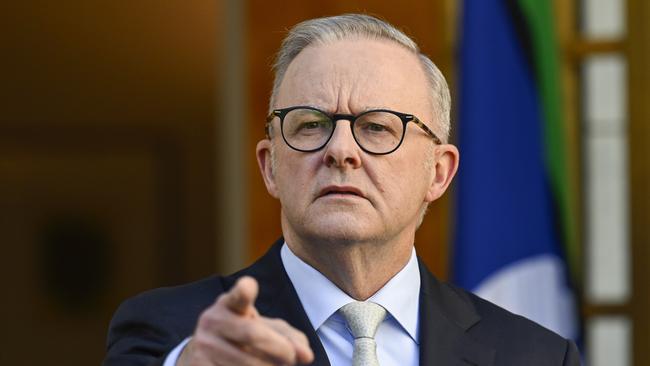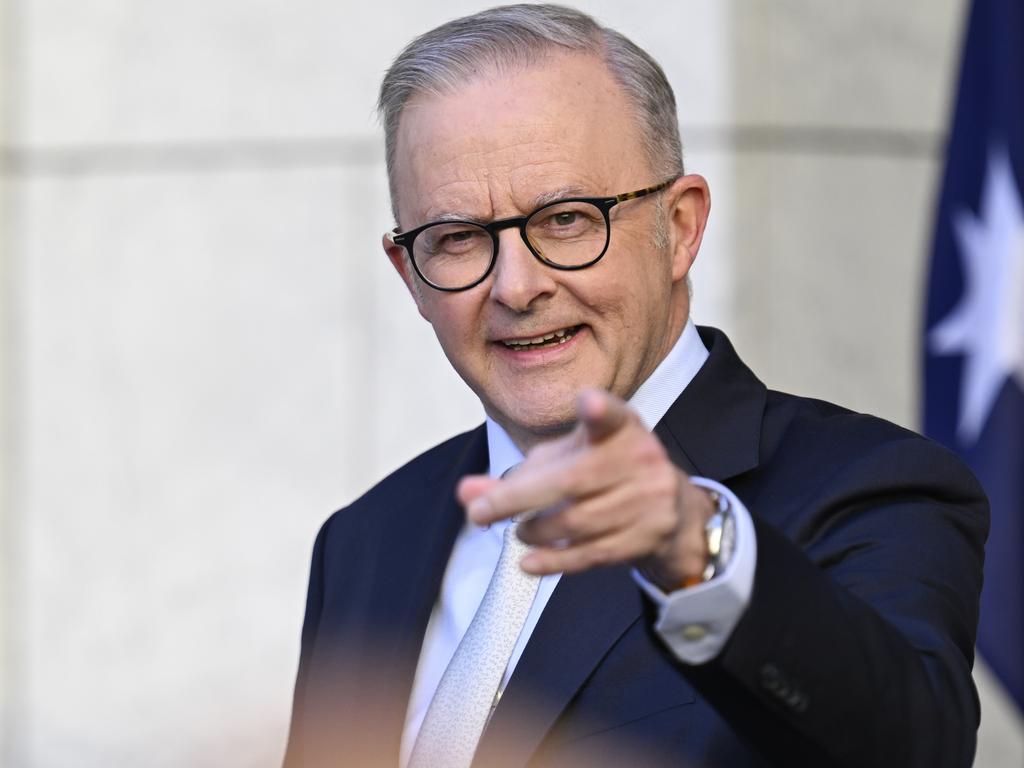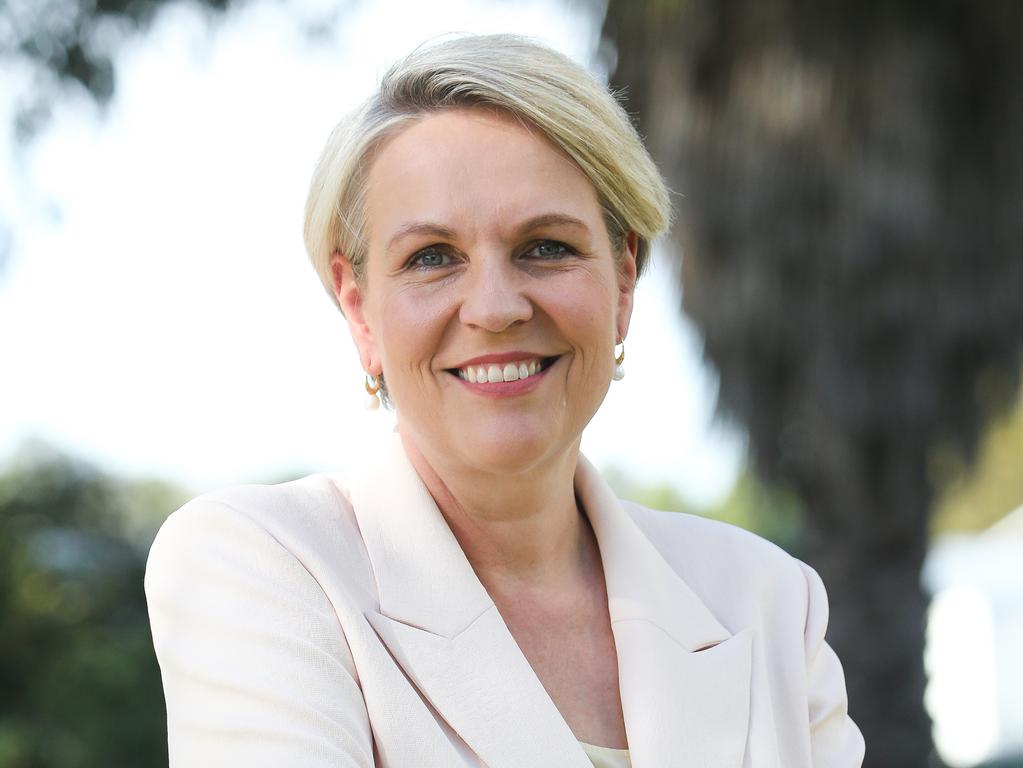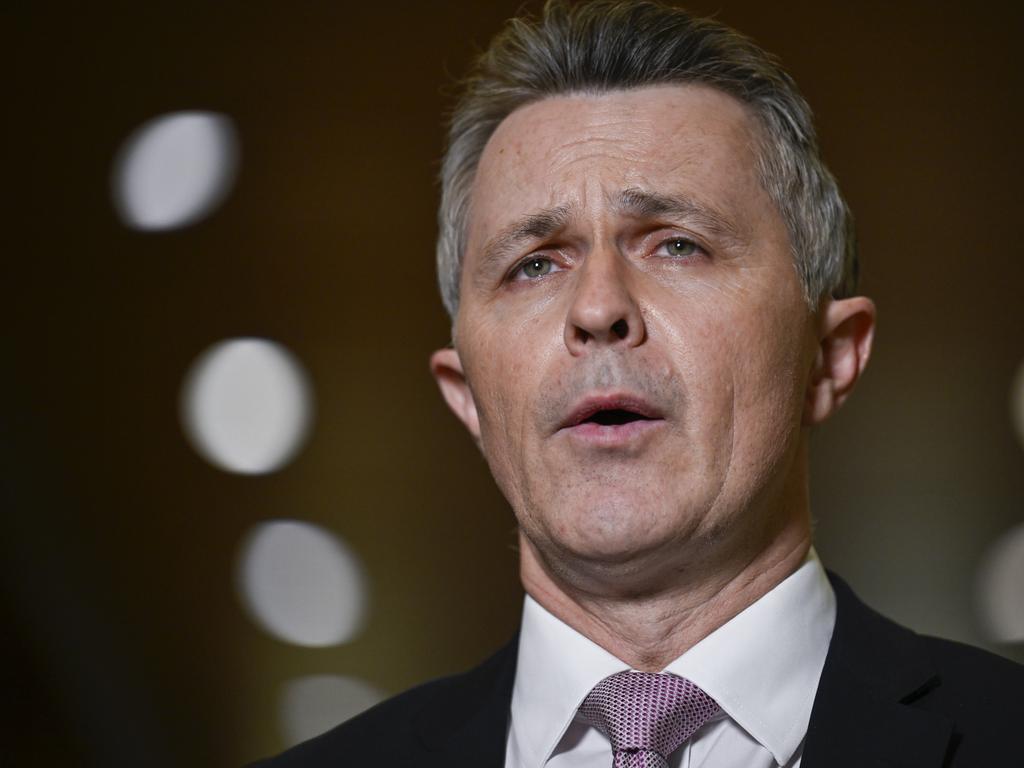Watt the? Anthony Albanese’s big ministry reshuffle delivers allies promotions
Anthony Albanese has used his post-election ministerial shake-up to shaft longtime factional rival Tanya Plibersek and promote close ally Murray Watt to finalise Labor’s contentious nature-positive reforms.

Anthony Albanese has used his post-election ministerial shake-up to shaft longtime factional rival Tanya Plibersek and promote close ally Murray Watt to finalise Labor’s contentious nature-positive reforms and a decision on the $34bn North West Shelf gas project.
In a move described by Labor MPs as a demotion, the Prime Minister on Monday announced Ms Plibersek would become social services minister and be replaced by Senator Watt in the environment and water portfolio he described as “really central” for the government.
After factional powerbrokers last week axed Mark Dreyfus and Ed Husic from the ministry, Michelle Rowland and Left-faction powerbroker Tim Ayres, a close confidant of Mr Albanese, were elevated as the new attorney-general and industry minister.
Mr Albanese also confirmed major machinery of government changes including moving the National Disability Insurance Scheme into the Department of Health, which was immediately criticised by disability groups who did not want a “medical lens” applied to the NDIS.
The second-term Albanese government will also backflip on shifting key security agencies, including the Australian Federal Police and ASIO, out of the Department of Home Affairs and into the Attorney-General’s Department.
Home Affairs Minister Tony Burke, a key enforcer for Mr Albanese, will take charge of a super department similar to the Coalition model rejected by Mr Dreyfus. Mr Albanese linked the changes to “information-sharing” issues that arose from the explosives-laden caravan incident in Dural last year.
Health and Ageing Minister Mark Butler, a close factional ally of Mr Albanese, will take charge of the NDIS, supported by Jenny McAllister in the outer ministry. Other winners in the new Albanese government ministry included West Australian MP Anne Aly, elevated into cabinet as small business and international development minister, Anika Wells, who takes on the communications and sport portfolios, and new employment and workplace relations minister Amanda Rishworth, who will lead Labor’s IR agenda.
Labor economic guns Daniel Mulino and Andrew Charlton also won big promotions, with Dr Mulino becoming assistant treasurer and financial services minister, and Dr Charlton stepping up as cabinet secretary.
Over the past three years, Ms Plibersek has faced internal pressure after she: failed to win parliamentary support for Labor’s nature-positive laws, including establishing a federal environment protection agency; struggled to manage community anger in Tasmania over salmon fisheries; and courted controversy over contentious mine and gas development applications.
Mining, business and farming groups on Monday urged Senator Watt, who is considered one of Mr Albanese’s top “fixers”, to overhaul his new department and bring in to line bureaucrats who “let down” Ms Plibersek.
Mr Albanese, who is on track to win more than 92 seats in the House of Representatives, said Senator Watt was “an outstanding performer as a minister”.
“I regard the environment as a really central portfolio,” the Prime Minister said. “It’s the only one I’ve ever asked for in this building, and I regard it as very much a senior role in a Labor government. Murray will do it very well.”
Asked if Ms Plibersek would remain as social services minister until the next election, the Prime Minister said: “This is the ministry that I’m announcing today … I hope it continues for three years across the board.”
Mr Albanese said Ms Plibersek had been “very positive” about taking on the social services portfolio, which primarily oversees the nation’s welfare system including JobSeeker dole payments.
Ms Plibersek’s she had had a “long interest” in social services and thanked Mr Albanese for the appointment to the role.
“It’s a portfolio that’s got enormous opportunities and, of course, serious challenges across the community,” she said in a video posted on social media. “Amanda Rishworth has done an amazing job in the portfolio, and I’m very grateful to her for the work that she’s begun, and I know also that my colleague Murray Watt will do a wonderful job in environment.
“So thanks to the prime minister for these appointments, I’m very much looking forward to getting straight to work on behalf of Australians.”
Senior Labor sources said the appointments of Ms Rowland and Ms Rishworth were being viewed as promotions, while Ms Plibersek’s shift was seen as a “move down, or at least sideways”.
“This is just the continual problem (for Mr Albanese) of what to do about Tanya (Plibersek),” one MP said.
The lack of Jewish or Islamic envoys, or for a Future Made in Australia minister, was widely accepted by MPs, who said there didn’t seem to be a clear “need” for those roles going forward.
The previous social services minister was in charge of implementing Labor’s promised “foundational supports”, which currently consist of an uncosted system of health and education supports that will sit outside of the NDIS and cater for those with milder disabilities.
The task to create the new system has been carved out of social services and will now sit with Mr Butler.
States and territories are yet to formally agree to any deal on foundational supports, which will be funded on a 50-50 basis with the commonwealth and likely cost billions of dollars.
Former NDIS minister Bill Shorten made clear when passing the landmark NDIS legislation that the new system would begin its rollout on July 1, which is now just 49 days away.
Ms Rishworth, who oversaw both social services and NDIS after Mr Shorten’s departure, in February attempted to distance herself from the July 1 deadline. The time frame and scale of the system present a significant challenge to Ms Plibersek.
Australian Federation of Disability Organisations chief executive Ross Joyce said placing the NDIS in the health portfolio potentially risked “medicalising disability” and undermined the scheme’s social model foundations, which were based on choice, control, and inclusion.
“It also fragments policy leadership across departments at a time when co-ordination is critical,” Mr Joyce said.
ADFO and other disability organisations have long argued for a stand-alone minister for disability to represent the 5 million Australians who have a disability rather than just the 600,000 on the NDIS.
Mr Albanese met Mr Husic on Monday after the former minister in charge of the government’s $15bn National Reconstruction Fund accused Mr Marles of being a “factional assassin” and claimed the Prime Minister should have intervened to save him.
Ahead of a swearing-in ceremony for his ministry at Government House on Tuesday, Mr Albanese said “I had a constructive discussion with Ed this morning”.







To join the conversation, please log in. Don't have an account? Register
Join the conversation, you are commenting as Logout